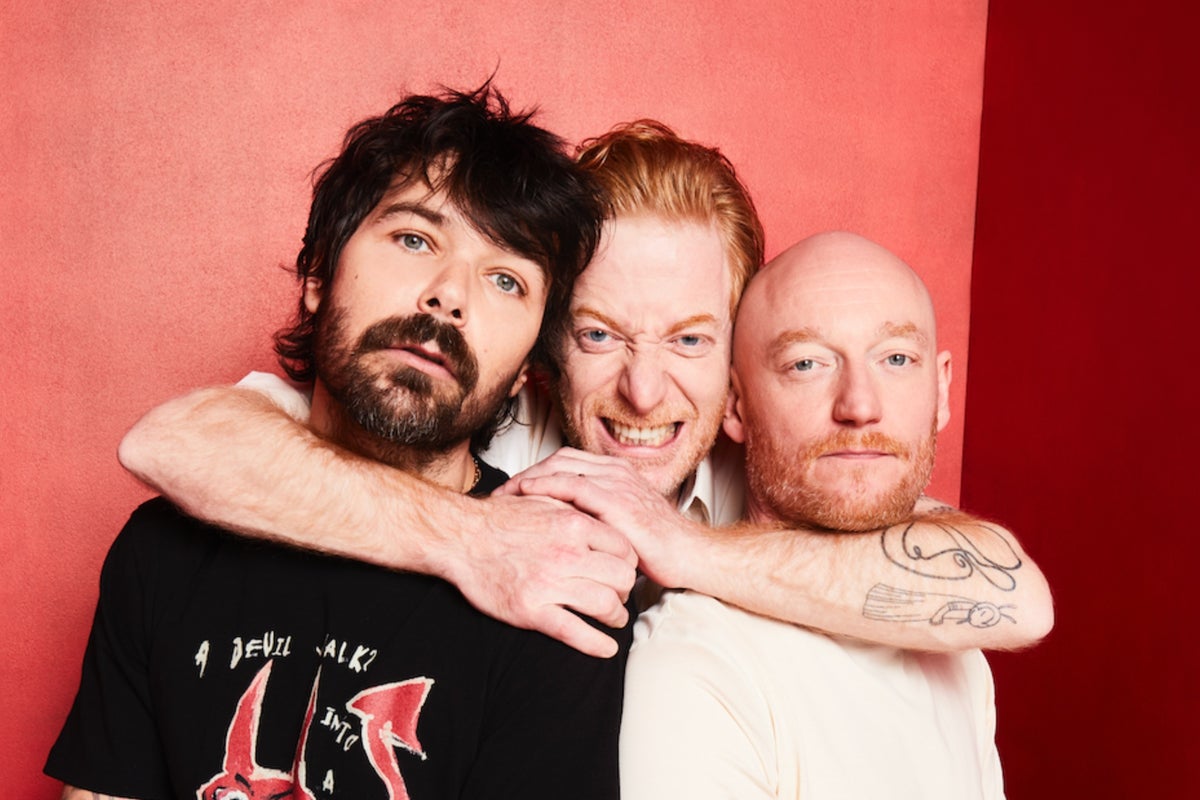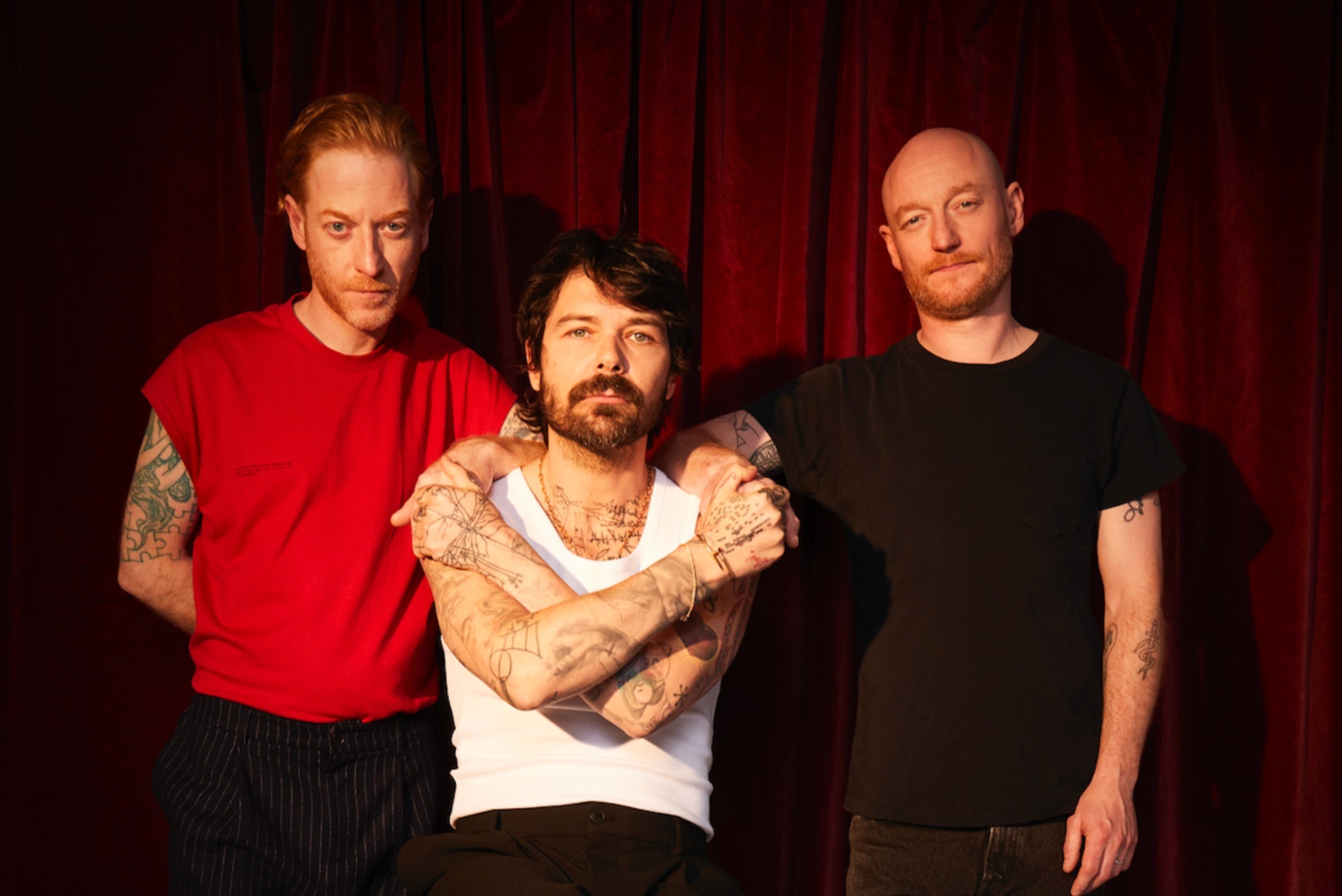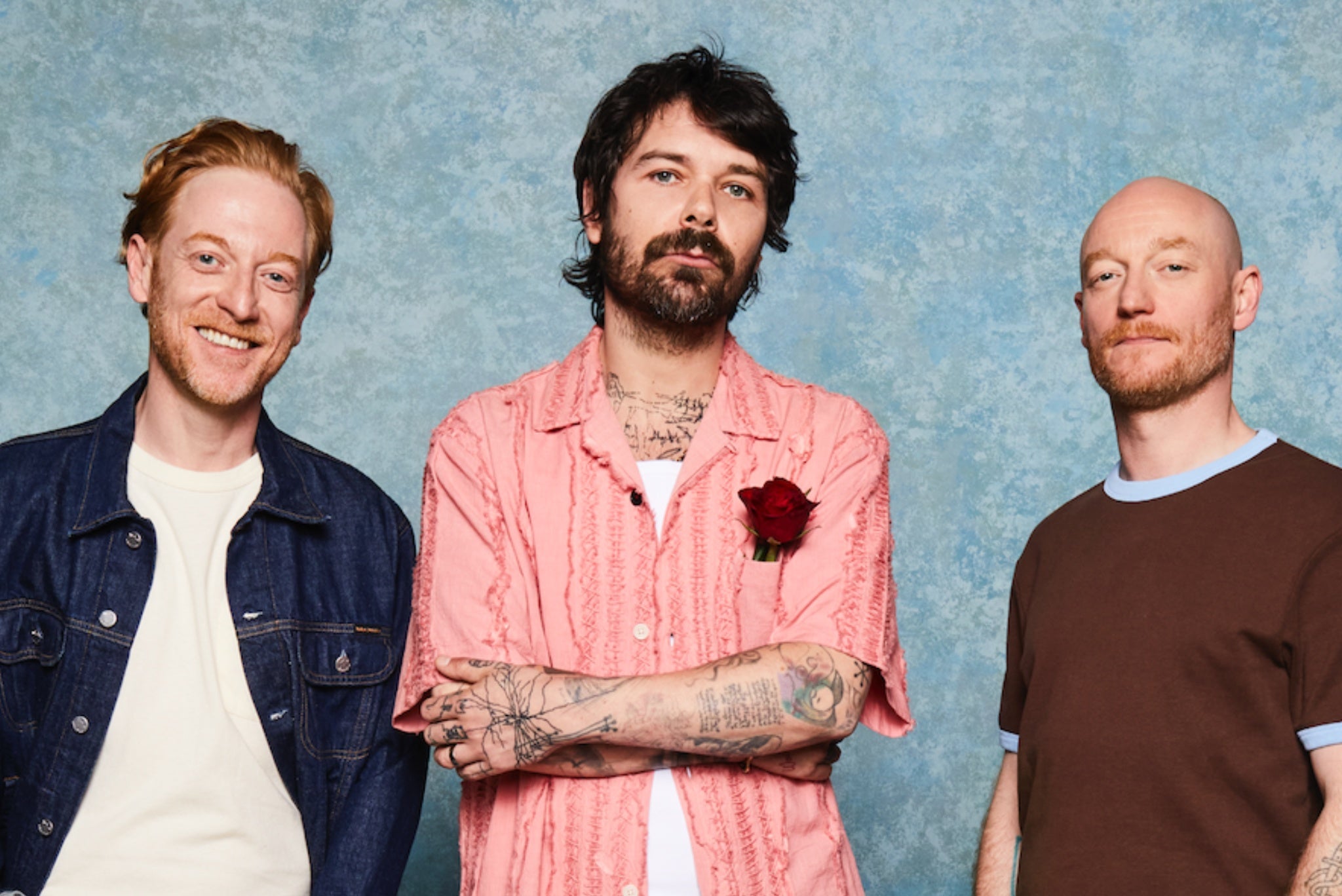
There was a point a few years back where Biffy Clyro seemed so futureless that frontman Simon Neil wrote them a suicide note. “It’s basically about just deciding to f*** this life off and go and see what’s around the other corner,” the tattooed, shirt-allergic singer says of an emotional new track titled simply, “Goodbye”. “It was like, ‘if this band was going to end, there’s nothing else’. It’s the thought of losing everything.”
From the beaming, chattering typhoon of charm, hugs and goodwill that whips into the plush penthouse office of their record label’s London HQ – as Simon and his bandmates, twin brothers James and Ben Johnston, billow out of the Tube strike traffic – it seems inconceivable that such a cheerful and successful band might ever go even fractionally Gallagher. Since the Kilmarnock trio bridged the yawning gap between hardcore rock and the mainstream with breakthrough albums such as Puzzle (2007) and Only Revolutions (2009), their story has epitomised the modern rock fantasy.
Six top-five albums – three of them No 1 – amassing over a million sales. Major chart hits with the likes of “Mountains” and “That Golden Rule”, back when the terms “chart hit” and “rock music” weren’t such irreconcilable strangers. There were headline sets at Download, T in the Park and the Isle of Wight Festival, and in 2010, they were even tossed into a Christmas chart battle with themselves when their single “Many of Horror”, retitled “When We Collide”, was selected as Matt Cardle’s X Factor winner’s song. A fan campaign saw the original version challenge Cardle from his eventual Number One. Mon, as the customary fan chant goes, the Biff.
Today – buoyed by the imminent release of their 10th album Futique – they seem as bonded, brotherly and full of bonhomie as ever. Yet in the wake of touring 2021’s tellingly titled The Myth of the Happily Ever After, their second album in 15 months, Biffy Clyro fell into a two-year hiatus, their first extended period without contact since they originally began playing together in their mid-teens, now 30 years ago.
“I really needed to take a break from creating for Biffy,” Simon says as, after five opening minutes of enthusiastic inquiry about my family developments and forthcoming novel, he steels himself to peer into the early-2020s abyss. “My well was dry. I was scared of picking up a guitar…We’re at the stage of being a band where I just don’t want to put out songs because it’s time for more Biffy songs. It needs to be something that feels essential.”
The strains of the pandemic, with its numerous tour postponements, cancelled shows, insurance paranoias and hotel room isolations, sucked the joy from the Myth… tour. “We weren’t able to feel like a gang,” says Simon. “By the end of it we didn’t know what way was up or down. Every day, we were on the cusp of f***ing losing it. It was a f***ing nightmare.”

At the end of the tour, the Covid-riddled band flew home on separate flights without being able to see each other to say goodbye. “Normally you finish a tour and you’re like, ‘F***ing yes, well done’ and you feel fulfilled,” says Simon. “At the end of that there was no fulfilment, it was relief, as if we’d made it through a minefield without getting our leg blown off.” Later, there were conversations about calling it a day on Biffy Clyro altogether. “We did have that chat,” he ruefully admits. “What kind of band are we going to be? What do we want to be? Because we could go out and do shows where we wouldn’t ever need to write another song, [but] I’m not interested in that and I don’t think the boys are either.”
In fact, the idea of becoming a nostalgia band disgusts him. “I’m so preoccupied with the next thing,” he says. “I’m still convinced that the next song I write will be the best song we’ve ever had, and the world will rejoice.” Not for Biffy, then, the 10-year split and big Oasis comeback? “I’d take $400m,” he laughs. “But [music] is still the pulse of humanity. I just want our music to be a part of life. Sorry, I’m sounding like a f***ing hippie.” He mimes sucking on an enormous joint. “Get this guy a doobie!”
Instead Biffy took a time-out. Simon worked on regaining some perspective on the flesh at the heart of the Biffy machine – “I put so much intensity in the music and what we’re creating that sometimes I can forget we’re human beings” – and exorcised his frustrations in the noise metal band Empire State Bastard. His bandmates did “normal things” like gardening, catching up with friends and having existential crises. “Twenty-some years of just head down, a*** in the air, getting on with it, being James from Biffy, and then not doing that was not just, ‘What am I doing?’ but, ‘Who am I?’” James confesses. “This was a big change, a big examination of oneself. When you look under the hood you end up with a few more questions… This little bit of time was a bit of an existential crisis, and then putting all the pieces back together.”
Meanwhile, all his extremo screaming in Empire State Bastard led Simon to let off his melodic steam on a number of songs that would build into Futique. Ironically, it was “Goodbye” – an open suicide note as much about his darker days as the potential demise of Biffy – that became the foundational track of a deeply personal, inward-looking album. “It’s a weird life, this,” he muses on the theme. “It’s the highest highs, but also the lowest lows. It’s the nature of things. If you’re reaching a peak, you’ve got to trough, it’s f***ing physics.”
If you're reaching a peak, you’ve got to trough, it's f***ing physics
Reuniting after two years apart was a similarly bumpy business. There were some rare blow-ups because, Simon says, “I came back flying, James came back lying down. Another band might have crumbled at that point.” But the unbreakable Biffy brotherhood – and recording at Berlin’s storied Hansa studios saw them through. “You equate difficulties in your life to the band,” says James. “But then it turns out the band’s the answer.”
The author of albums about his mother’s death (Puzzle), marriage (Only Revolutions) and “life and having miscarriages and things, and realising that maybe you have to grieve your future” (2013’s Opposites), Simon is an instinctively frank and diaristic songwriter. “Some people have beautifully colourful and florid language,” he says, “but when I’m singing, I’m like, ‘I feel s***!’ Inevitably, then, Futique – finding the band on peak arena rock form – tackles the ups and downs of long-term friendship and band life on the likes of “Friendshipping”, sonic Biffy biography “Woe is Me, Wow is You” and first single “A Little Love” (key lyric: “This time last year it all fell to pieces”).
One major inspiration was Simon looking back through his trove of band and family photos, after 20 years of aversion to the rear-view mirror. “I realised how many special moments in my life I’ve just lived through and not actually enjoyed at the time,” he says. “I just want to try [to] enjoy these things as they’re happening to us and not just in hindsight.”

This hasn’t been aided, he explains, by the fact that many of the band’s best times happened during some of the worst points in his personal life. “It’s given me this skewed vision of what it means to make art,” he says. “I’ve made a rod for my own back with the songs that I’ve written over the last 15 years, but I don’t feel [nervous] now. When Puzzle came out there were points where I couldn’t even listen to that record. I’m like, ‘What have I done? Why have I poured this in?’ [But] I think that’s what my art’s for…What we do is we sing the things that are f***ing real.”
Which, on “Hunting Season”, extends to the hellscape of modern social media and its ceaseless, inhuman finger-pointing. “We’re all too f***ing guilty of just passing this flippant judgment,” Simon says. “It’s talking to myself as much as anything else, and saying, ‘Come on, give people a break’.” Solidarity, he feels, has been devoured by in-fighting. “We’ve forgotten there’s different types of opposition…If you don’t share the exact position that someone has, then you’re the enemy.” Alternatively, he suggests that Elon Musk’s takeover of Twitter, now X, was a good thing: “It’s just become this fetid right-wing battleground. I think that actually helped expose s*** for what it was. It made everyone go, ‘Really? What, Musk is going to be the f***ing judge of all this s***?’ [and] allowed us to take a step back.”
Like many PWPs (People with Platforms), Biffy struggle with navigating the quicksand of current online discourse. “Do you lend your voice to something that you believe in, or is it just f***ing tweeting something into the ether?” Simon considers. “You read people going, ‘you’ve got to let people know where you stand’. I get that, but then I don’t want to add to the cacophony.”
He objects to the demonisation of Kneecap and Bob Vylan, the latter friends of the Biff. “They should be allowed to say whatever they like,” he argues. “Not calling for the death of anyone, but the sentiment of what they’re doing… Do they not have a right to stand on a stage and give their opinion? I’m really encouraged that people have that strength to speak up, because it’s not easy to do. We need to learn more from the younger generations about, yeah, put your neck on the line a little more.”
For some minutes, we wrestle openly with the fundamental dilemma of the contemporary rock interview. Whether, on their part, to honestly speak one’s mind at risk of widespread condemnation – not to mention overshadowing your proud new work. And whether, on ours, it’s fair to ask for their thoughts when any answer, or none at all, could be a career-killer. “We’re obviously skirting with the fact that we’re basically talking about Gaza and Palestine,” he concludes, “and it is ridiculous that talking about a genocide over there is risky.”
Several hours after our interview, Simon phones up to clarify his position. “I do really respect young bands out there speaking out and by showing that respect I should probably speak out too,” he says. “I wanted to make sure we could put a flag in the ground without necessarily becoming that band where that’s all we talk about. But at this moment in time, s***’s too far gone to ignore…”
He continues: “What’s happening in Gaza and Palestine is one of the most disgusting things ever, it’s heinous, it needs to f***ing stop. Any human life that’s being treated that way, things need to change. Genocide and famine anywhere in the world need to f***ing end… It’s a minefield, but sometimes it’s a minefield you have to walk across to get to the right side of things.”

His take on Keir Starmer, and the PM’s emboldening of Reform, is just as forthright. “If it’s between Starmer and Nigel Farage and f***ing Reform then I would rather eat s***,” he says. “Labour shouldn’t be competing with f***ing Reform. It says an awful lot in the world that that’s the head-to-head that’s happening…” He laments the arrival of Scotland’s first Reform MSP, Tory defector Graham Simpson, and “that c*** Farage” and his stated plans to send women back to Afghanistan. “We’re all of an age where we remember the promising future. The potential of this liberal utopia,” he says. “Now we’ve just receded back into this.” He mimes a flag-daubing neanderthal.
His advice? “Get the NHS working, get housing working, stop just playing to the loudest people. The loudest people that are shouting are the only people that don’t get ignored. There’s so many of us that want things to get better, but we’re not necessarily out f***ing screaming.”
Thankfully Biffy themselves are evolving in direct contrast to the country’s direction. “Because there’s been that break, it feels like a new beginning,” says James. Simon speaks warmly of how the welcome they received from the summer’s festival crowds dissipated their worries of being forgotten during their brief absence. “It’s always a relief when you get up there and it’s like, ‘all is good in the world again’,” he says. Save your goodbyes: the Biff are back.
‘Futique’, the new album from Biffy Clyro, is out on Friday 19 September







